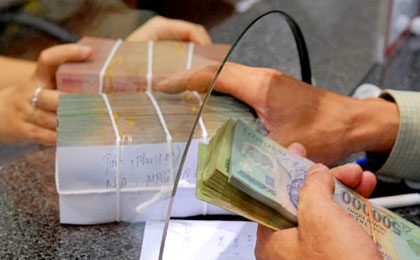Economic misfortune rocks the house

illustration photo
The National Assembly questioning session sees State Bank governor Nguyen Van Binh discuss issues like bank restructuring, non-performing loans or stuck credit garnered special attention from the public.
When softer interest rates and foreign exchange market stability were appraised as two ‘plus’ to the management of Binh, then unsettled bad debts, slowing bank restructuring, firms struggling to get loans and mess in the bullion market were regarded as the Governor’s four major problems albeit it might be unfair to put all the blames on the Governor management.
In respect to bank restructuring efforts, many deputies assumed bank restructuring had progressed at a snail pace while lacking transparency.
Cross-holdings between banks and their associated companies and group interests were among central issues in the session involving Binh.
As for the bullion market, though Decree 24/2012/ND-CP on gold business management came in force a half year ago, the gold market is still shaky. Management policies are almost short-term whereas effective measures to raise gold from the community have yet to be in place.
However, the most stinging issue which could dim economic rebound is firms’ capital distress since throngs of firms could not put hands on loans.
In fact, up to 40 per cent of firms could not or have to borrow at dear costs, according to Vietnam Small and Medium Size Enterprises Association chairman Cao Si Kiem.
“The 3.3 per cent credit expansion so far this year fails to uphold firms grow. Firms even did not dare to borrow as they fear with such high lending rates the more they do, the bigger the losses,” Kiem said.
Ho Chi Minh City deputy Tran Hoang Ngan had attributed non-performing loans to current stuck credit.
Advocating this mindset, senior financial expert Dr. Le Xuan Nghia assumed banking system and the economy’s most thorny issue at present was bad debts.
Nghia said it would take at least 10 years for banks to address their bad debts using internal strength. As a consequence, economic growth would slow down or even face zero per cent growth in that period.
“Firms will face a cessation of operations and dissolution in ever-increasing number unless the government took on the task of tackling bad debts,” Nghia said.
Of the bad debt structure, those in property reportedly occupied 20-30 per cent. In basic construction local governments owe construction firms VND90 trillion ($4.2 billion) and non-performing loans at Vietnam Development Bank (VDB) amount to VND35-40 trillion ($1.6-$1.9 billion) mainly lent to state businesses.
Bad debts in the form of state budget, VDB and state firms’ loans account for a large part in current debt structure, so the state is crucial in tackling bad debts.
“To address capital woes, the government or State Bank issuing bonds to raise fund would be a wise decision in current context,” Nghia commented.
What the stars mean:
★ Poor ★ ★ Promising ★★★ Good ★★★★ Very good ★★★★★ Exceptional
 Tag:
Tag:
Related Contents
Latest News
More News
- Foreign leaders extend congratulations to Party General Secretary To Lam (January 25, 2026 | 10:01)
- 14th National Party Congress wraps up with success (January 25, 2026 | 09:49)
- Congratulations from VFF Central Committee's int’l partners to 14th National Party Congress (January 25, 2026 | 09:46)
- 14th Party Central Committee unanimously elects To Lam as General Secretary (January 23, 2026 | 16:22)
- Worldwide congratulations underscore confidence in Vietnam’s 14th Party Congress (January 23, 2026 | 09:02)
- Political parties, organisations, int’l friends send congratulations to 14th National Party Congress (January 22, 2026 | 09:33)
- Press release on second working day of 14th National Party Congress (January 22, 2026 | 09:19)
- 14th National Party Congress: Japanese media highlight Vietnam’s growth targets (January 21, 2026 | 09:46)
- 14th National Party Congress: Driving force for Vietnam to continue renewal, innovation, breakthroughs (January 21, 2026 | 09:42)
- Vietnam remains spiritual support for progressive forces: Colombian party leader (January 21, 2026 | 08:00)





















 Mobile Version
Mobile Version